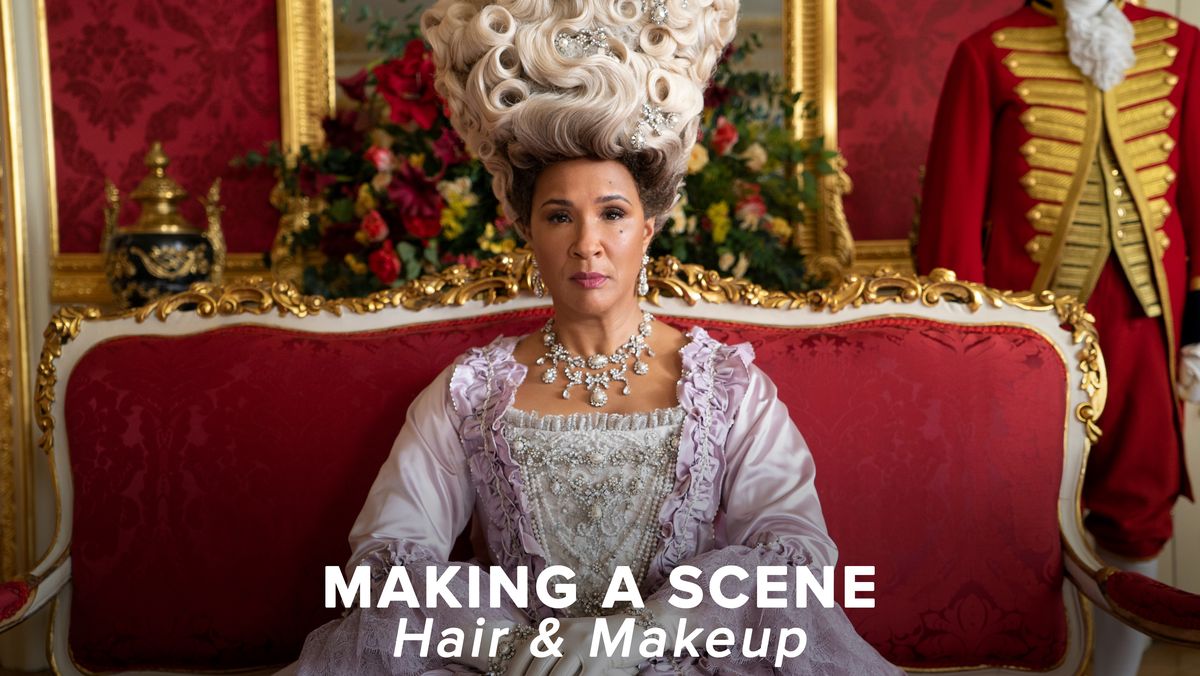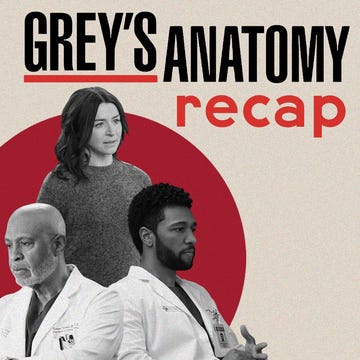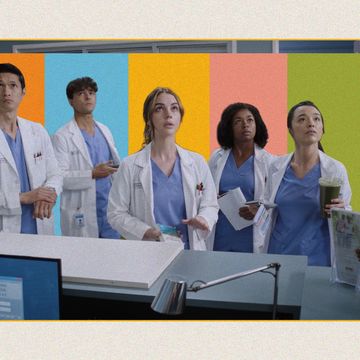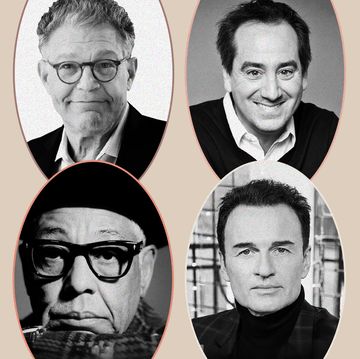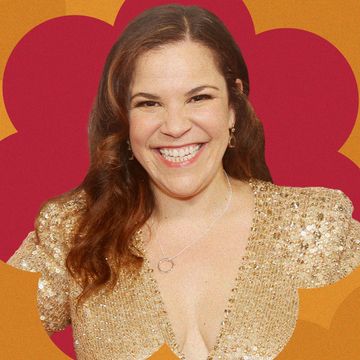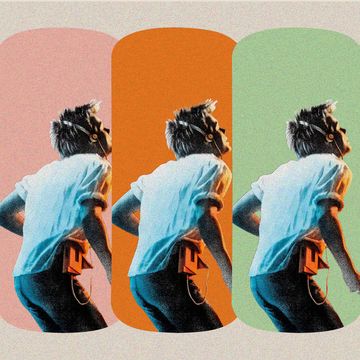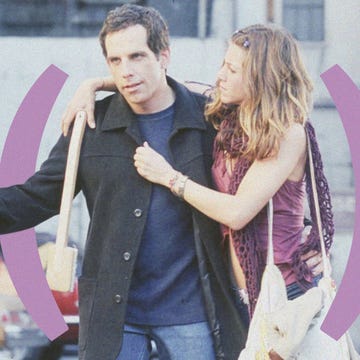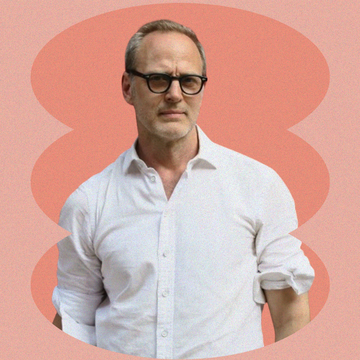Kate Winslet has never been an actress we can put our thumb on. Between her breakout role in Titanic, a delightfully quirky turn in Eternal Sunshine of the Spotless Mind, or an Oscar-winning performance in The Reader, Winslet is one of those actors who constantly imbues any character, no matter how obvious they might seem at the outset, with the unexpected. And her latest role is no different.
In the new Francis Lee film, Ammonite, Winslet plays a snappy, independent fossil-finding paleontologist named Mary Anning in 1840s England. This isn’t your average period drama; in fact it’s a lesbian love story between Winslet and her paramour, the young, rich (and married) Charlotte Murchison, played by Saoirse Ronan.
With some calling the film Portrait of a Lady on Fire meets Summerland, or even Carol with a dash of Wuthering Heights, Ammonite is actually a story about a woman who fought to survive in a time when women couldn’t even vote. Anning’s own life has never hit the silver screen until now, perhaps because her work was often collected by the British Museum and, as was typical in the patriarchy, then replaced with the names of the rich men who bought her work.
“Historically, her achievements were extraordinary,” says Winslet of Anning, a legendary fossil hunter who found her first skeleton at the age of 12, and then went on to make historic finds in the Jurassic marine fossil beds in the cliffs along the English Channel. “Much more than we were even able to show in the film, in that our story was allocated in space and time of two hours. I hope this is only the beginning of people being really inspired by her and wanting to tell more of her story.”
Ahead of the film’s premiere, Winslet spoke to Shondaland from her home in the UK about bringing heroines to screen, using her voice for good, and the importance of female producers.
NADJA SAYEJ: The film unearths much of Mary Anning’s past. How did you work with the Lyme Regis Museum to help recreate part of her life?
KW: They were so instrumental in helping because they had possession, at the time, a part of one of Mary Anning’s journals. Not all of them still exist, but they had one on a short term loan. That, in above itself, touching a document that old, dated 1804, was the most extraordinary document. They have some of her findings, her fossils, but the people who work there are also so passionate about paleontology and the work Mary did. She really is in their flesh and blood, they really felt honored to help us. But for me, it was the other way around. I felt incredibly honored to have their support. But there was a wonderful woman named Lizzie Wiscombe, who works at the Lyme Regis Museum and she helped me with the voice of Mary Anning.
NS: How does this film do justice to Mary Anning, who was overlooked in science as an “unsung hero of fossil discovery” until now?
KS: I hope in many ways that Ammonite is the beginning of many stories told about Mary Anning. Although she died sadly from breast cancer in her late 40s, she still lived a very vast life. Historically, her achievements were extraordinary. Much more than we were even able to show in the film, that our story was allocated in space and time of two hours. I hope this is only the beginning of people being really inspired by her and wanting to tell more of her story. That would be utterly incredible, truly. She did live a large, vast life that was challenging, full of extraordinary achievement. Hopefully, it will inspire other people to tell other sections of her lifetime.
NS: What was one of the hardest parts of shooting this film?
KW: One of the things that was difficult to show was the level of poverty that she truly did live in. It was very extreme for her and her mother and her siblings, as she was one of seven children, but they all died before her. One died in a house fire at the age of four, another died of smallpox, which was one of the typical poverty illnesses of that era. She had lived through all of that. Mary lived through enormous grief, struggle, and hardship. I wish if we had more screen time, that we were able to capture the level of her hardship even more. We had to cut out things like her brother, and so on. It was hard for Francis Lee, the director, to not keep that character as part of the film, in the end.
NS: How difficult was it to be an independent woman back then? Women couldn’t even vote.
KW: Oh my God! Women haven’t been able to really vote for that long, really. [Laughs]. Listen, it was a class-ridden patriarchal society. It was a level of repression that was systemic. And wrong. Mary’s successes were taken from her by rich, powerful men who weren’t as clever as she was. It's so appalling.
NS: Why is it so hard to tell truthful stories about strong female characters?
KW: It is! And the reason why it's so difficult to tell these kinds of stories is because people are afraid to fund them. I had a conversation with a colleague recently where we talked about why we don’t have enough of these stories. Why don’t we have more stories about strong female characters, specifically stories about strong historical women? Especially when their achievements have been covered up or taken from them by men. The reason for that is: People who have money to put into film don’t want to really be backing film s about women. They want to be backing films about men because those films do better at the box office. Sadly, that’s the truth.
NS: Wow.
KW: I think that’s part of the reason why we don’t have more of these important stories. People are simply afraid to put money behind them. Hopefully, with a film like Ammonite, it might help contribute to that important, evolving conversation about how needed these films are. If we don’t put these stories into the marketplace, when it comes to this younger generation of women who we’re all trying to support and inspire, who will inspire them?
NS: Well, in your own opinion, how can filmmakers move the needle toward telling more stories like Mary Anning?
KW: As a woman, what happens is, if we want to have these stories told, we have to have them made on these teeny, tiny budgets that make it really hard. Quite often, some people don’t have the courage to do that, because it's an exhausting process. To go through the entire process of trying to get a film made about your strong female character for six or seven years, and you have a family at home and have a lot of other people pulling on yo — some people just have to give up because, at a certain point, how far can you take it? How much can you hang onto your passion before it consumes you? Need and life just takes over. But that’s the reality. Ammonite was a tiny, tiny, budget. Tiny! And I love making films that way. It's one of the most thrilling things to me because that’s how I was raised, that’s how I began my career, which was making small, independent films. I always gravitate back to that mindset.
NS: So —
KW: Sorry, my seven-year-old with a three-year-old in tow, just walked in and they want to show me a magic trick. Can you just give me one second? [To the kids] It goes into the bag, and? Did it disappear? Where did it go? You’re so clever! Off you go boys, I’m talking to an important lady about Ammonite. Oh, you monkeys. Off you go, let me finish my interview. Thanks for the magic show! Love you guys. Go ask daddy! Shut the door, please. [Door slams].
NS: Well played! You sound like an amazing mom.
KW: Oh, they just did a magic trick with two pieces of Lego disappearing into a bag and I had to pretend I hadn’t seen that they actually dropped it on the floor behind them. It was very cute. But to go back to what I was saying, this is such a seismic time. Those of us who are in a position to use our voices, we just have to join together and use our voices carefully, kindly, with respect and integrity.
NS: Right.
KW: Because, f---ing hell. Life is short. And I really don’t want to go forward in my life, in any way, without feeling as if I have said my piece, or done my bit. Contributing to the world in a positive way. Contributing hopefully to evolving conversations and inspiring young women to use their voices to contribute, as well. In particular, the LGBTQ community. We just have to tell these stories in a normal way, without secrecy, without hesitation, no fear. We just have to share. We have to share.
Nadja Sayej is an arts and culture journalist based in New York City who has written 5 books, including Biennale Bitch and The Celebrity Interview Book. Follow her on Twitter @nadjasayej.
Get Shondaland directly in your inbox: SUBSCRIBE TODAY


